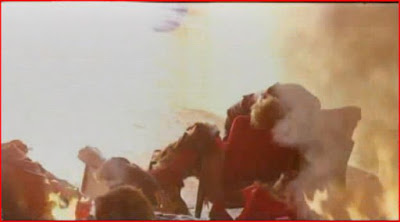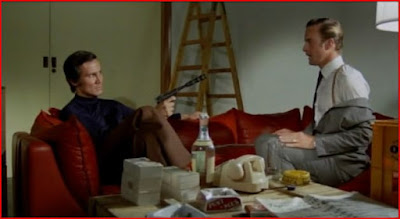 It's been claimed that Fernando Di Leo's use of an interracial team of hitmen in La Mala Ordina (aka Man Hunt) inspired Quentin Tarantino's casting of Samuel L. Jackson and John Travolta in Pulp Fiction. If so, then is it possible that the climax of Inglourious Basterds begins with the opening of the third film of Di Leo's so-called "Milieu" trilogy? Consider: a mystery man sneaks into a building where important men are arriving. His destination: a projection booth where he cows the projectionist into compliance. The mystery man is Henry Silva. The projectionist pleads for mercy.
It's been claimed that Fernando Di Leo's use of an interracial team of hitmen in La Mala Ordina (aka Man Hunt) inspired Quentin Tarantino's casting of Samuel L. Jackson and John Travolta in Pulp Fiction. If so, then is it possible that the climax of Inglourious Basterds begins with the opening of the third film of Di Leo's so-called "Milieu" trilogy? Consider: a mystery man sneaks into a building where important men are arriving. His destination: a projection booth where he cows the projectionist into compliance. The mystery man is Henry Silva. The projectionist pleads for mercy.Projectionist: Jesus, don't shoot!
Silva: He won't....Only he doesn't like skin flicks.
Projectionist: Jesus, my god!
Silva: He's not coming, so just keep quiet!
An elite audience of criminals has gathered to watch porno films. "That goes to show that not all Swedes are natural blonds," one comments as they watch the unseen show. Above and behind them, Silva sets himself to work. His weapon is a grenade launcher. He fires into the screening room.
He fires three times more, then uses a fifth grenade on a guard who comes running in at the wrong time. This is carnage above and beyond Di Leo's two previous films, and a police official will later equate the violence with the Vietnam War. "I'll bet they'll be using tanks soon," he remarks. This sets the tone for Il Boss, a devastating deconstruction of the crime film genre, dispensing even with the one sympathetic protagonist you can find in either Milano Calibro 9 or La Mala Ordina.
Silva plays Nick Lanzetta, a hitman and orphan who was for all intents and purposes adopted by Don Giuseppe Daniello, an underling of Don Corrasco (Richard Conte). They've sent Nick to destroy Don Attardi, who collaborated with interlopers from Calabria in selling hard drugs in Sicily when they were only supposed to pass through on the way to foreign parts. It turns out that I was wrong in assuming that all three Milieu films took place in Milan, since Il Boss plays out in Palermo, where, ironically, the Sicilians despised elsewhere in Italy look down on the Calabrians. That attitude extends to the Palermo police, represented by Commisario Torre (Gianni "Sartana" Garko). The Calabrians, represented by gang leader Cocchi, despise the Sicilians in return.
Again, Di Leo introduces social and political context that's often absent from crime or poliziotteschi films. On this occasion, he also overturns the tough-cop archetype of the poliziotteschis, since Garko's cop, who comes on strong as he interrupts the mourning for the porno movie victims, turns out to be a piccione, an informant for Don Giuseppe and Don Corrasco. It amused me to see the actor I identify with one of the ultimate badass spaghetti western heroes playing a complete weasel, a twisted authoritarian who blames the current chaos in Palermo on the government's exiling the old Mafia leaders. "It's just that there's no discipline," he argues at one point, "We need order, even if it's Mafia order." Adapting a novel, Il Mafioso, by Peter McCurtin, Di Leo subverts the typically reactionary stance of Italian cinema cops by putting an explicitly reactionary cop on the side of equally reactionary crime bosses.Cocchi: We're just rag-ass peasants to you! I know, if a man has nothing, Commisario, life is very simple. So my men will take risks that you'll never take. They've nothing to lose.
Torre: Bravo, Cocchi, bravo! Apparently you've become Maoist.
By the time Di Leo is done, all ideas of authority and loyalty are pretty much dashed. The main plot of the film involves the kidnapping of Don Giuseppe's daughter Rina by Cocchi's men as revenge for the movie bombing. Cocchi wants Giuseppe to give himself up in return for his daughter, and the old man is willing, but Don Corrasco forbids it. Compromising in any way with Cocchi is unacceptable; that goes for paying ransom as well. This is when Corrasco tells Giuseppe that "family doesn't matter." But which family is he talking about? Isn't the Mafia made up of families? Indeed, the Mafia family takes precedence. "Nothing is yours," he tells Giuseppe, "not even your daughter, not when it endangers your family and the organization." After sending Giuseppe away, he instructs Nick to kill Giuseppe, his surrogate father, if he attempts to negotiate separately with Cocchi. In time, Giuseppe will urge Nick to disregard the order. Despite Nick's assertion that "Don Corrasco is God," Giuseppe insists that Corrasco has no right to dismiss Rina's likely death as "the will of God." He finally convinces Nick to see things his way and to set up a ransom payment, or so we think until the time of the scheduled rendezvous, when Nick kills Giuseppe as ordered, along with Giuseppe's right-hand man. In this scene, Silva conveys the death of a man's soul; you can see the self-loathing in his eyes as he embraces his victim and his own betrayal of the nearest thing he ever had to real family. Just as Mario Adorf successfully portrayed two different characters for Di Leo in Calibro 9 and Mala Ordina, Silva accomplishes the same feat in Mala Ordina and this film.
Meanwhile, Rina has also been betraying her father's honor. He's paying her way through college, where she's become a frivolous student radical, a drug user, and a tramp. It takes little more than one glass of booze to get her fraternizing with her captors, notwithstanding their threat that "you're gonna get laid until your feet come." Apparently that would be fine with her. And when Nick finally rescues her, after killing her father and pocketing his ransom money, she just as carelessly shacks up with him in his dismal porno-papered bachelor pad in a relationship of bodily satisfaction and mutual contempt. "You just screw baby, don't think," he advises her. He's disgusted by her lack of feeling when he finally tells her that her father's dead, but she answers with contempt for a father who was nothing but a criminal. Family really does mean nothing.
As Rina, Antonia Santilli submits for inspection, but from then on its pretty much consensual all the way.
Nor does it mean anything to Don Corrasco, who yields pretty quickly to political pressure to make peace with Cocchi by throwing Nick under the bus and setting up Torre to kill him. That guarantees that family will finally mean nothing to Nick, since the film will climax with his outright rebellion against the Don. But there are betrayals yet to come beyond the climax, and never has it been so bleak a moment when a movie closes not with the word "Fine," but with "Continua."
Gianni Garko negotiates with Richard Conte (above) and Henry Silva (below), not exactly from a position of strength in either case.
Il Boss is a soul-crushing film, and I mean that as a good thing. It's a movie of nihilistic moral cruelty that indicts cops, criminals and civilians alike, leaving no one for audience identification unless the audience suffers from collective low self-esteem. Our putative hero is really a scumbag, but who's any better? At least in Nick's case you can see that he was brought up in a certain quasi-moral system built on certain premises that are suddenly all kicked out from under him. None of the conventional escape routes in genre fiction (the police, the love of a good woman) are available to him. He can only keep doing what he's been doing, which is to exterminate all the brutes until somebody maybe takes him out someday. The fact that Nick is the only one of the trilogy's protagonists to survive gives us an idea of the larger point Di Leo is making.
The story of Il Boss is hellish enough, but why not include a literal metaphor for Hell in the form of a fiery furnace in which the mobsters deposit victims, dead or alive?
Here's the Italian trailer again, which rightfully boasts of Di Leo's past work and promotes Il Boss as if it really was the culmination of a trilogy rather than the open-ended affair the film itself claims to be.











Damn! This is the only part of the trilogy that I've yet to see, and after this review I'm dying to see it.
ReplyDelete...this review almost makes me feel ashamed for never having seen this. Good job.
ReplyDeleteGreat series of reviews Sam.
ReplyDeleteHi Sam, Just wanted to let you know that "99 River Street" has recently surfaced for viewing on Hulu.com. Hope this comment finds you!
ReplyDeleteTo get an idea of what Mark's talking about and why I'll be checking out Hulu soon, take a look at his review of 99 River Street at Where Danger Lives, a great site for noir enthusiasts: http://wheredangerlives.blogspot.com/2009/08/99-river-street-1953.html
ReplyDeleteWhoah - mucho posting while I've been away! I haven't seen either this or the last one yet, despite having seen MC9 god-knows-how-many times.
ReplyDeleteHowever, this is set to change as I've now ordered the Thug City Chronicles set - thanks for making me aware of it! Think I'll get the Sartana one too.
Does anyone know the name of the song that plays at 0:54 during the scene where Lanzetta rescues Don Guieeppe's daughter??
ReplyDelete